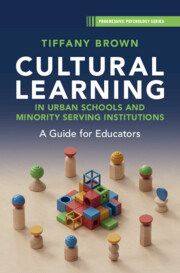Book contents
- Cultural Learning in Urban Schools and Minority Serving Institutions
- The Progressive Psychology Book Series
- Cultural Learning in Urban Schools and Minority Serving Institutions
- Copyright page
- Contents
- Figures and Tables
- Introduction
- Chapter 1 An Action Science Approach to Cultural Learning in Urban Schools and Minority Serving Institutions (MSIs)
- Chapter 2 Directly Observable Data on K-12 Teachers in Urban Schools
- Chapter 3 Culturally Accepted Meanings and Understandings Shared by K-12 Urban Teachers
- Chapter 4 Individual Action Strategies K-12 Urban Teachers Use at Work
- Chapter 5 Collective Action Strategies K-12 Urban Teachers Use at Work
- Chapter 6 Single-Loop Learning and Double-Loop Learning Conditions in Urban Schools
- Chapter 7 Implications from the Systematic Review for Four Types of Cultural Learning K-12 Urban Teachers Engage in at Work
- Chapter 8 Empirical Research on College Faculty Thinking and Action in a Minority Serving Institution
- Chapter 9 Faculty Value Orientations for Single-Loop Learning and Double-Loop Learning at Work with Students from LIMCCs
- Chapter 10 Consequences of Model I and Model II Values for Learning across Student–Teacher Cultural Differences in MSIs
- Chapter 11 Faculty Variance in Use of Traditional and Culturally Responsive Classroom Management Strategies
- Chapter 12 Consequences of Variance in Use of Traditional and Culturally Responsive Classroom Management Strategies for Learning across Student–Teacher Differences in MSIs
- Chapter 13 Implications from the Empirical Data for Instructor Learning across Cultures in MSIs
- Conclusion
- Appendices
- References
- Subject Index
Chapter 4 - Individual Action Strategies K-12 Urban Teachers Use at Work
Published online by Cambridge University Press: 20 March 2025
- Cultural Learning in Urban Schools and Minority Serving Institutions
- The Progressive Psychology Book Series
- Cultural Learning in Urban Schools and Minority Serving Institutions
- Copyright page
- Contents
- Figures and Tables
- Introduction
- Chapter 1 An Action Science Approach to Cultural Learning in Urban Schools and Minority Serving Institutions (MSIs)
- Chapter 2 Directly Observable Data on K-12 Teachers in Urban Schools
- Chapter 3 Culturally Accepted Meanings and Understandings Shared by K-12 Urban Teachers
- Chapter 4 Individual Action Strategies K-12 Urban Teachers Use at Work
- Chapter 5 Collective Action Strategies K-12 Urban Teachers Use at Work
- Chapter 6 Single-Loop Learning and Double-Loop Learning Conditions in Urban Schools
- Chapter 7 Implications from the Systematic Review for Four Types of Cultural Learning K-12 Urban Teachers Engage in at Work
- Chapter 8 Empirical Research on College Faculty Thinking and Action in a Minority Serving Institution
- Chapter 9 Faculty Value Orientations for Single-Loop Learning and Double-Loop Learning at Work with Students from LIMCCs
- Chapter 10 Consequences of Model I and Model II Values for Learning across Student–Teacher Cultural Differences in MSIs
- Chapter 11 Faculty Variance in Use of Traditional and Culturally Responsive Classroom Management Strategies
- Chapter 12 Consequences of Variance in Use of Traditional and Culturally Responsive Classroom Management Strategies for Learning across Student–Teacher Differences in MSIs
- Chapter 13 Implications from the Empirical Data for Instructor Learning across Cultures in MSIs
- Conclusion
- Appendices
- References
- Subject Index
Summary
This chapter extends the argument that K-12 urban teachers learn through organizational socialization to adopt shared cultural meanings about their students that inform the individual actions they use to manage cultural differences between themselves and their students. It argues that these actions operate to increase, maintain, or decrease relational distance – or the perception that there is psychological status and structural distance amongst individuals within an organization – between teachers and their students. It also begins to develop the argument that urban-teacher actions may vary based on the nature of their organizational commitment – in particular how the type of commitment they have for their work informs their perceptions and management of various role stressors in their workplace environments.
Keywords
- Type
- Chapter
- Information
- Cultural Learning in Urban Schools and Minority Serving InstitutionsA Guide for Educators, pp. 51 - 60Publisher: Cambridge University PressPrint publication year: 2025

